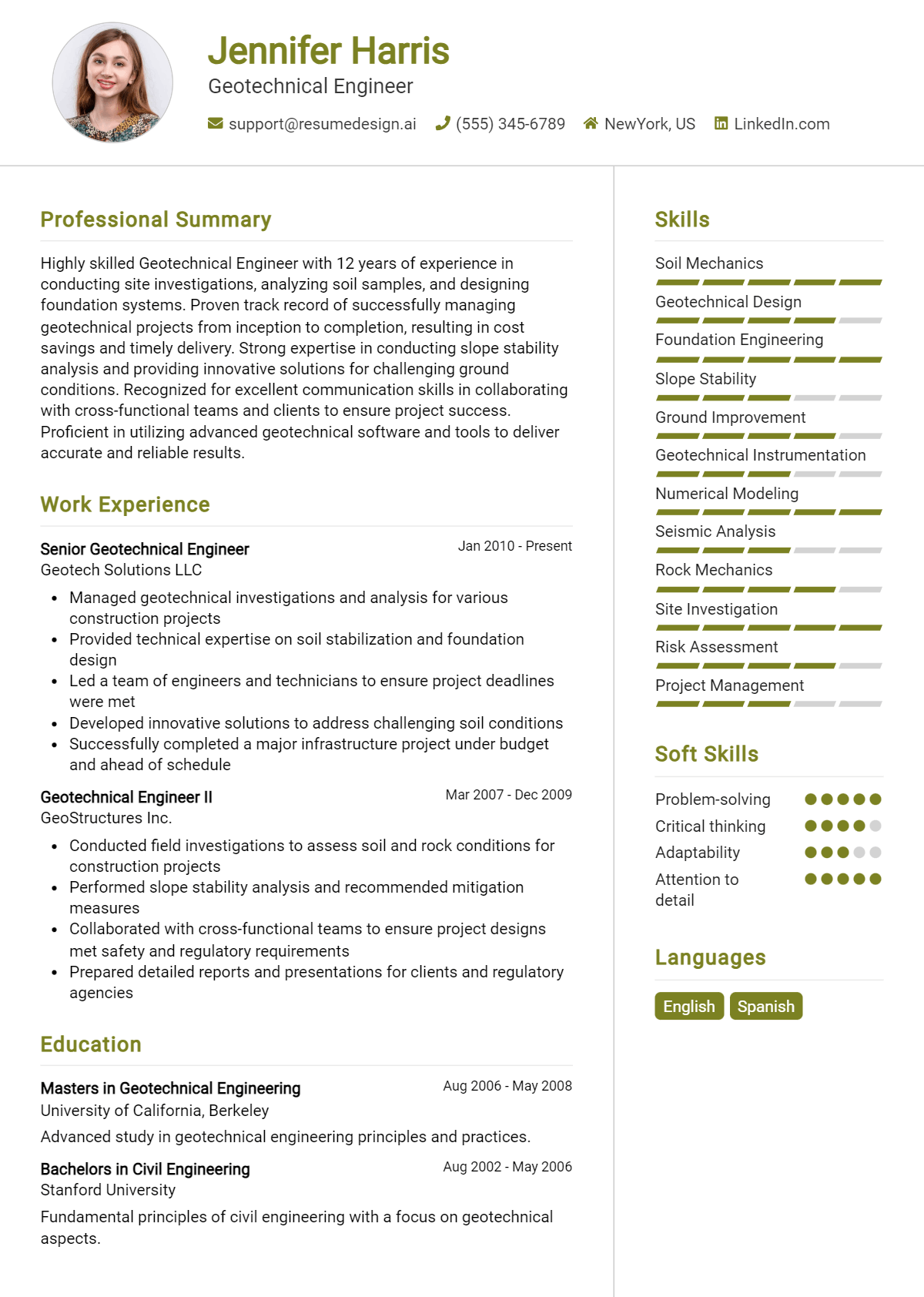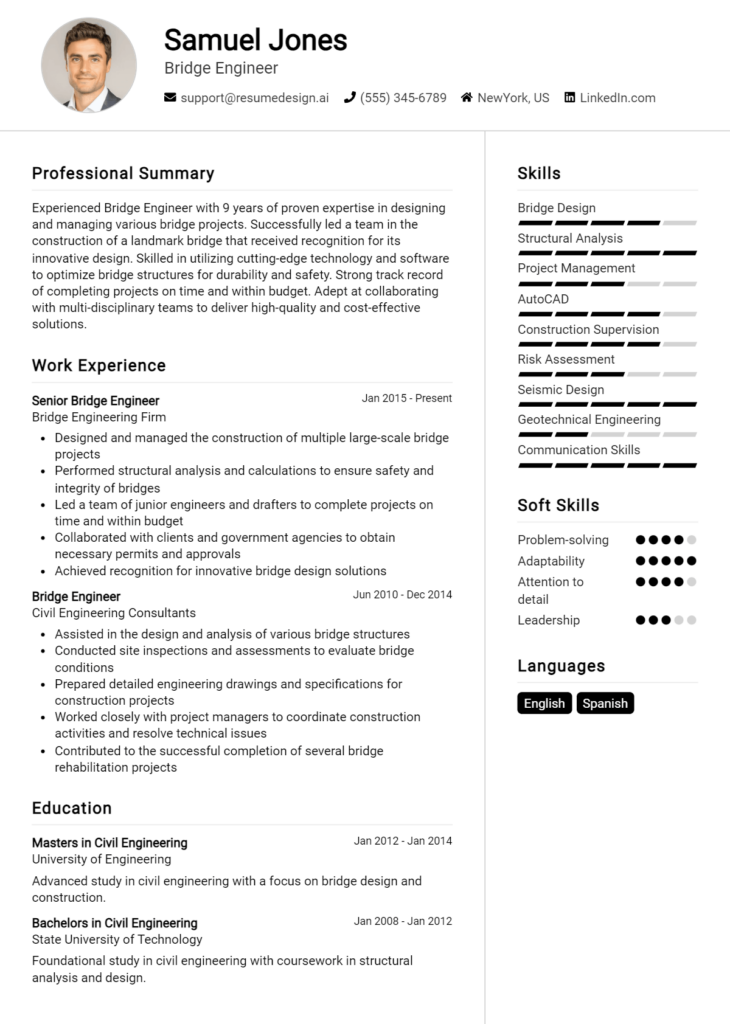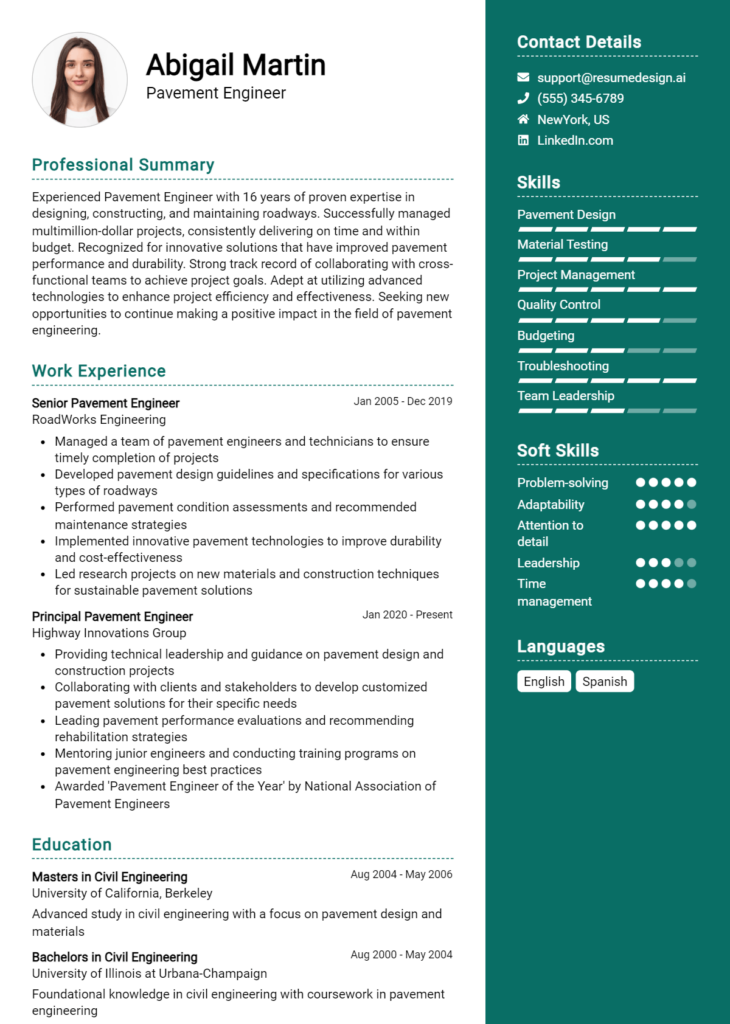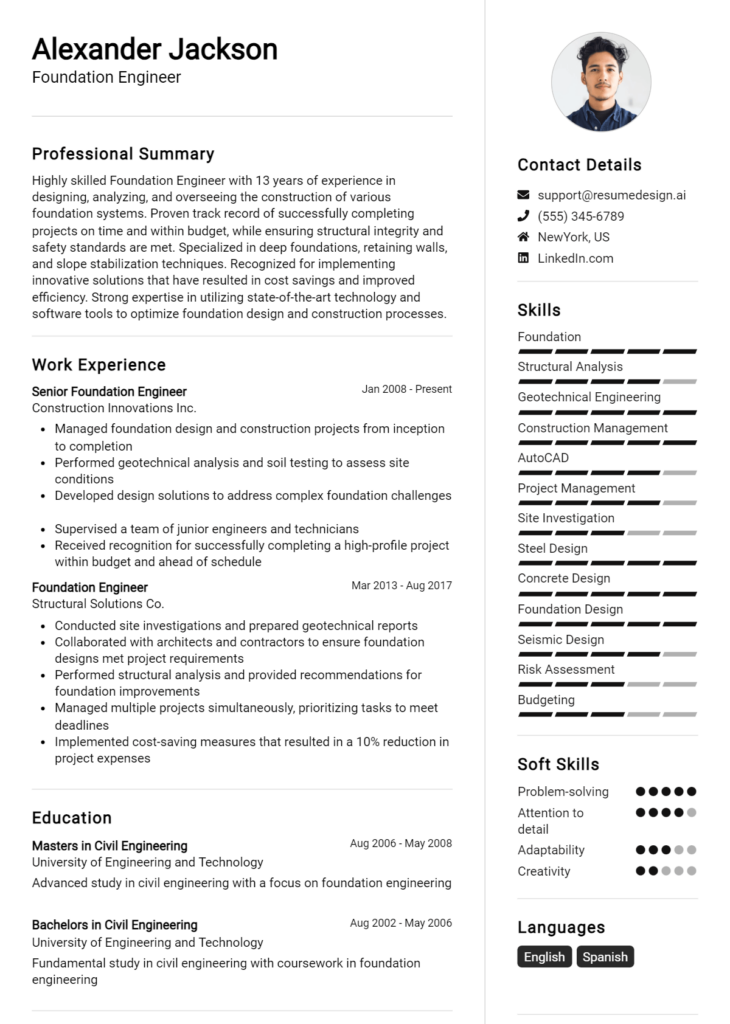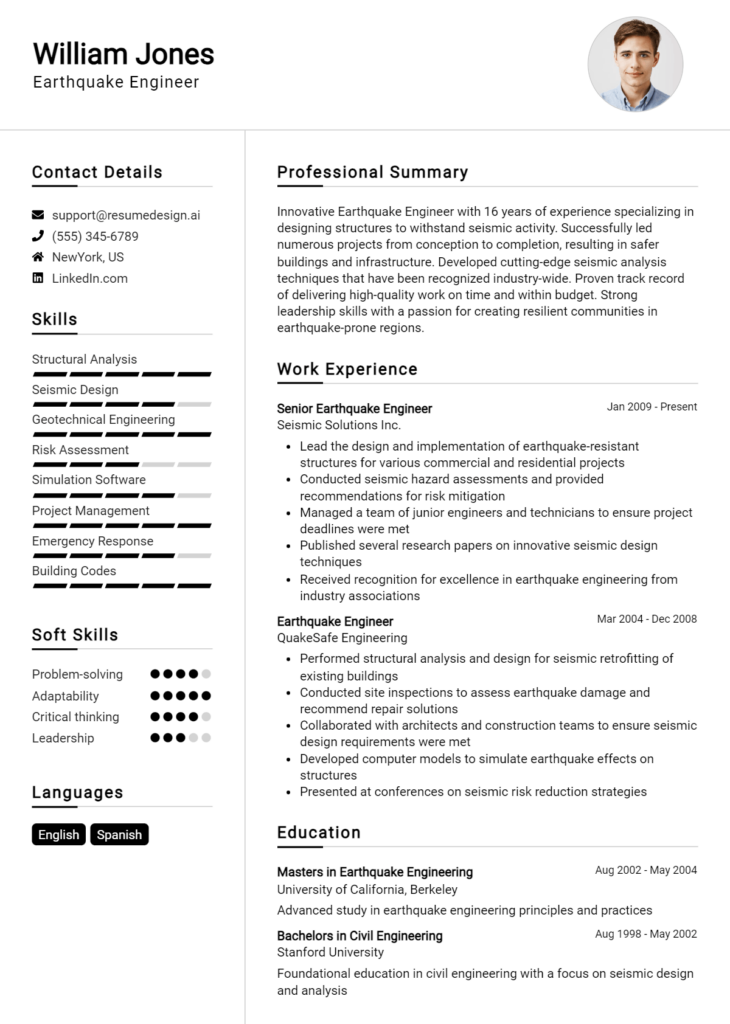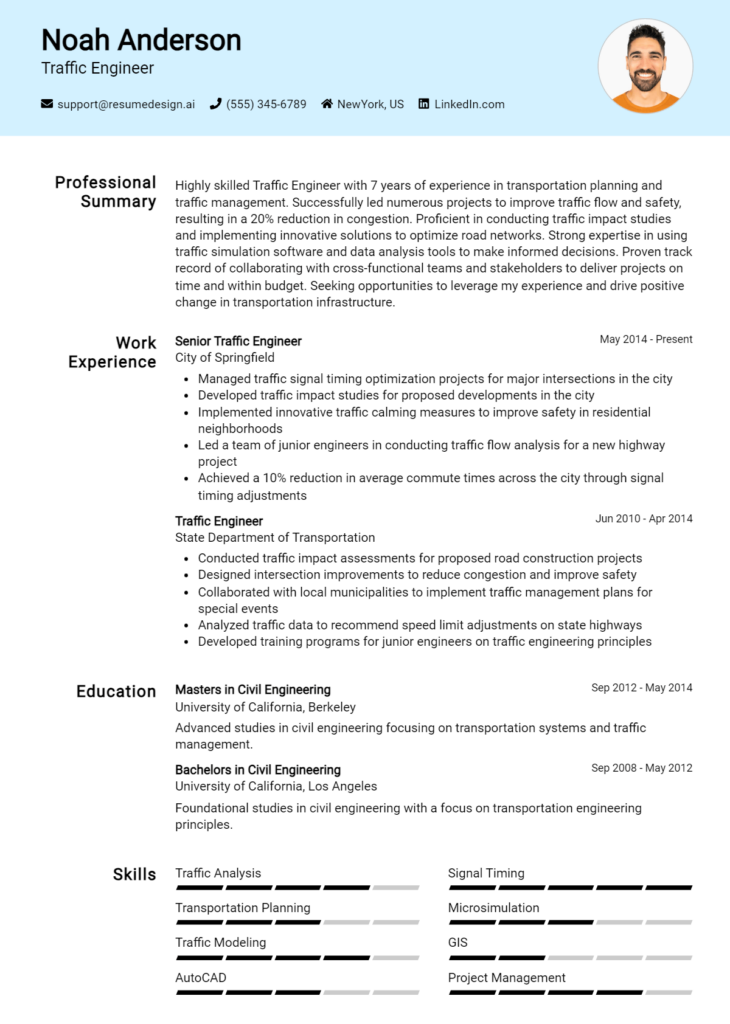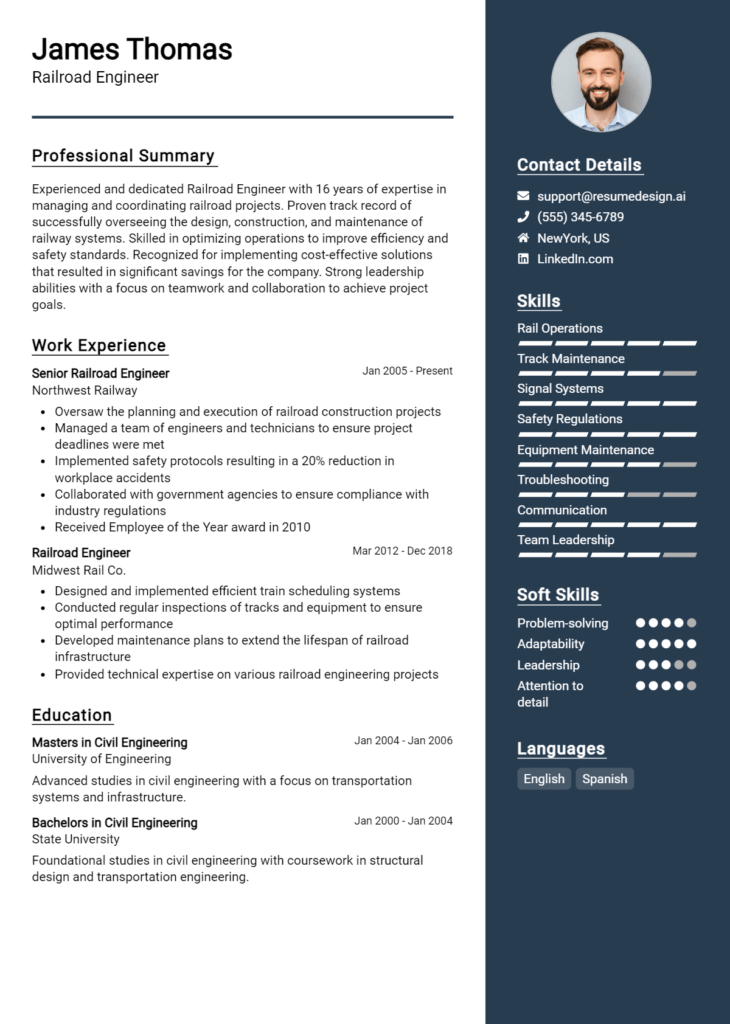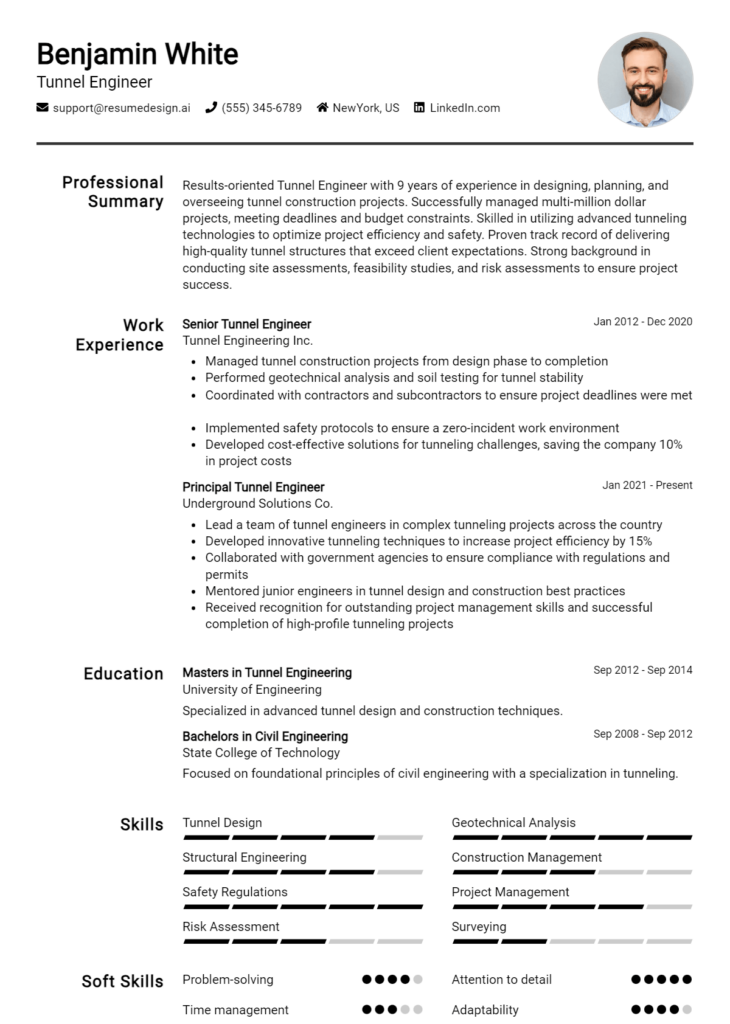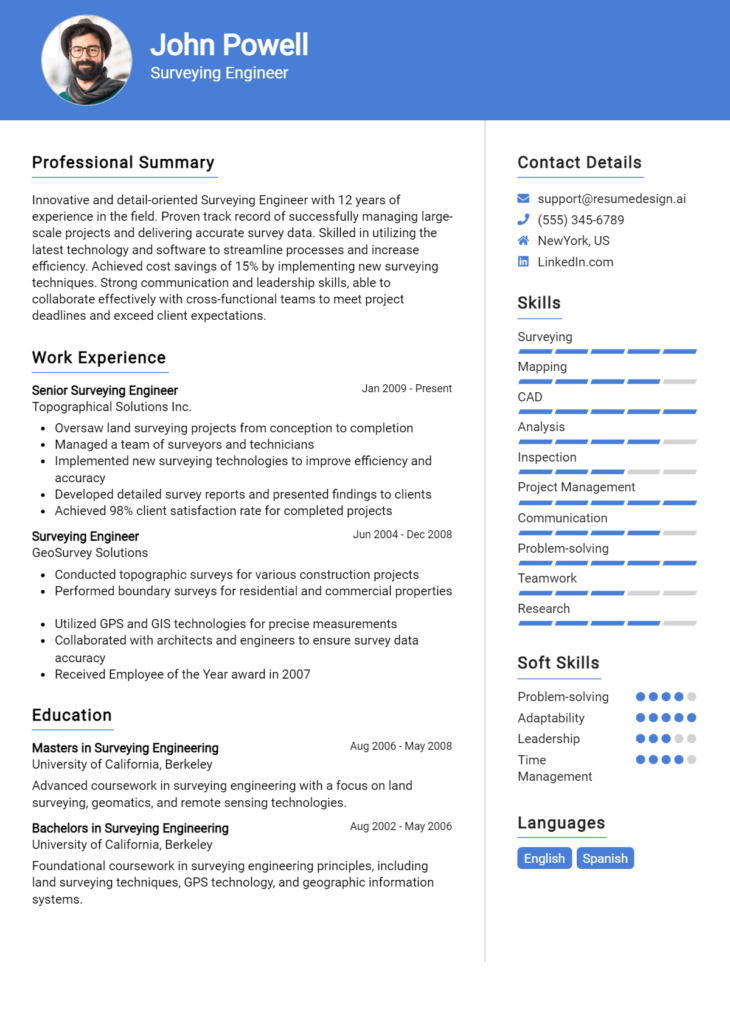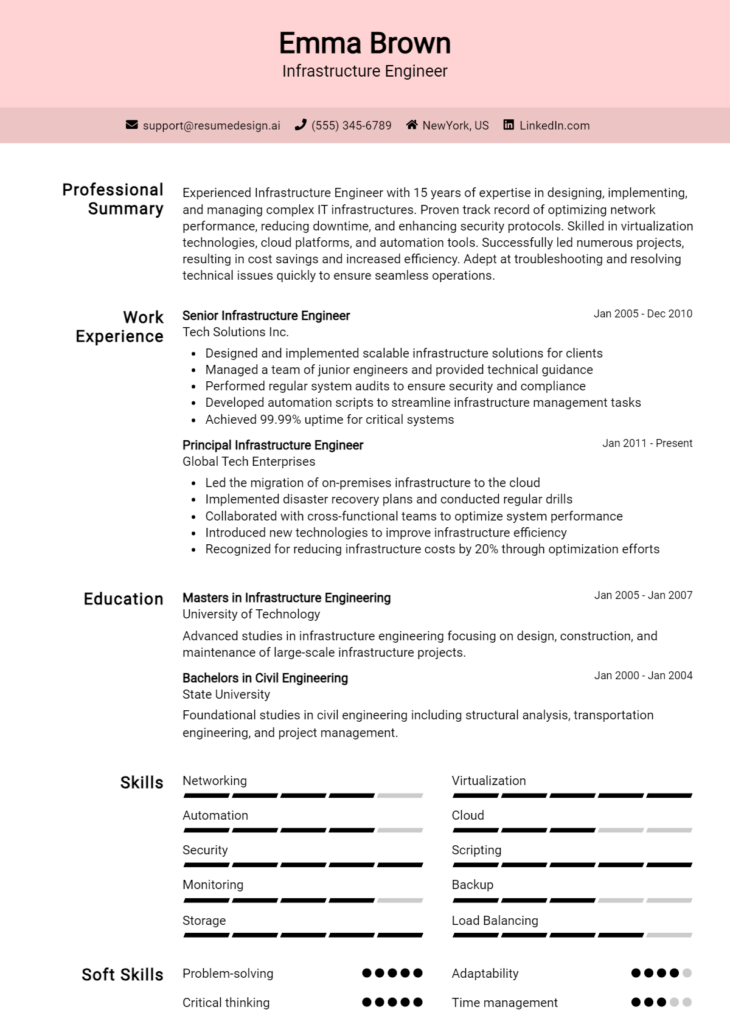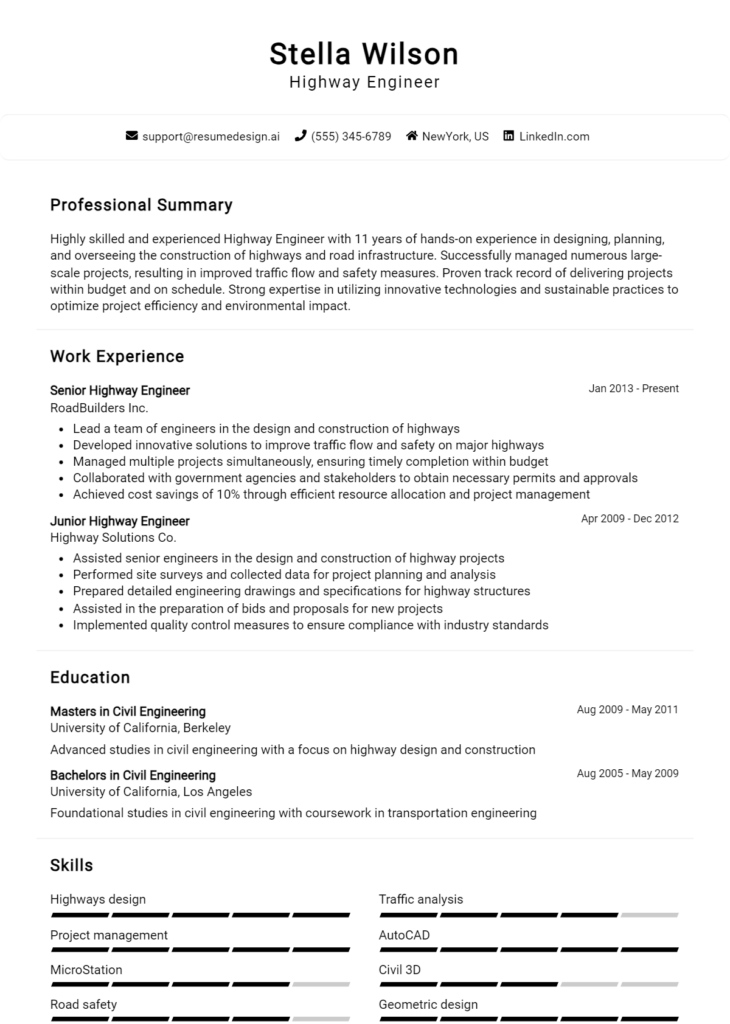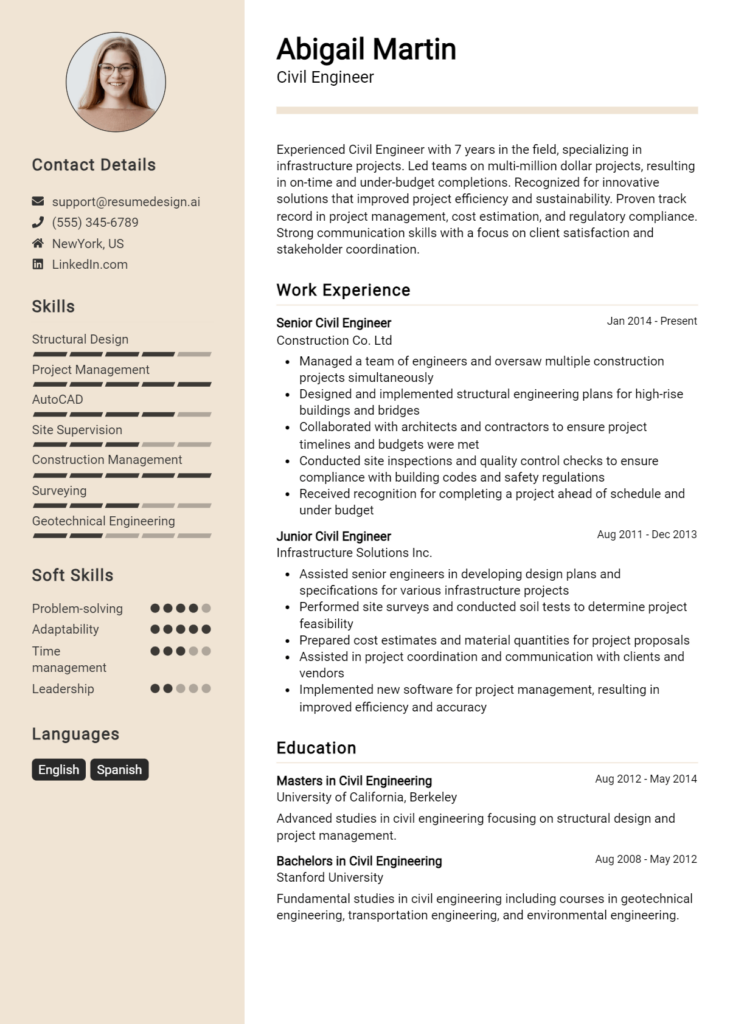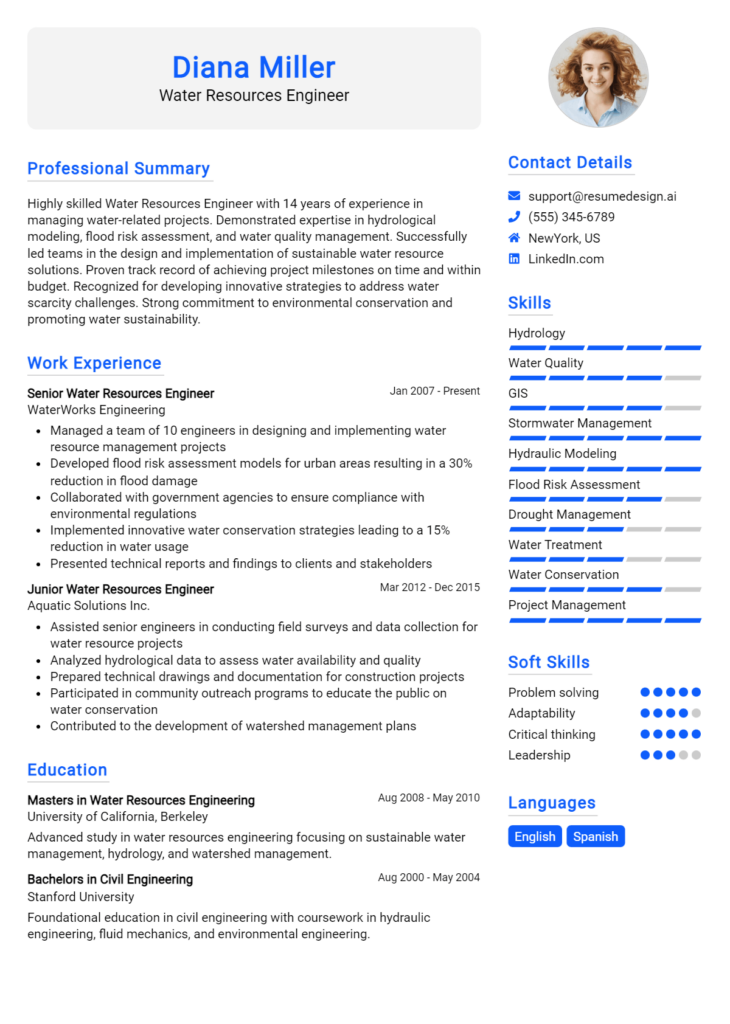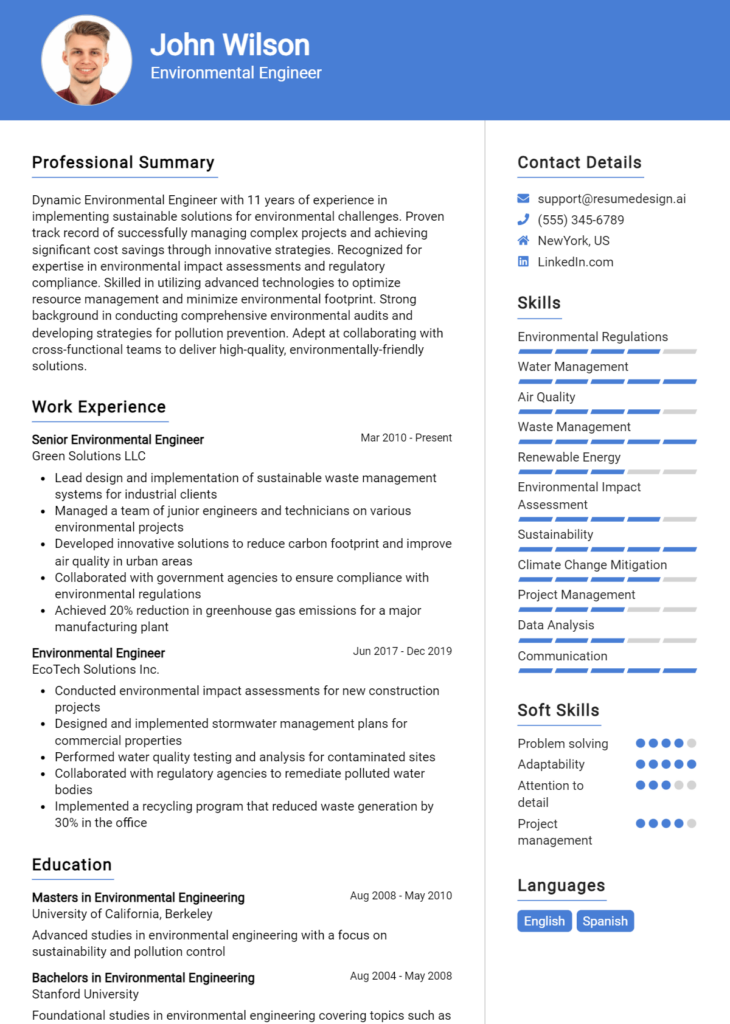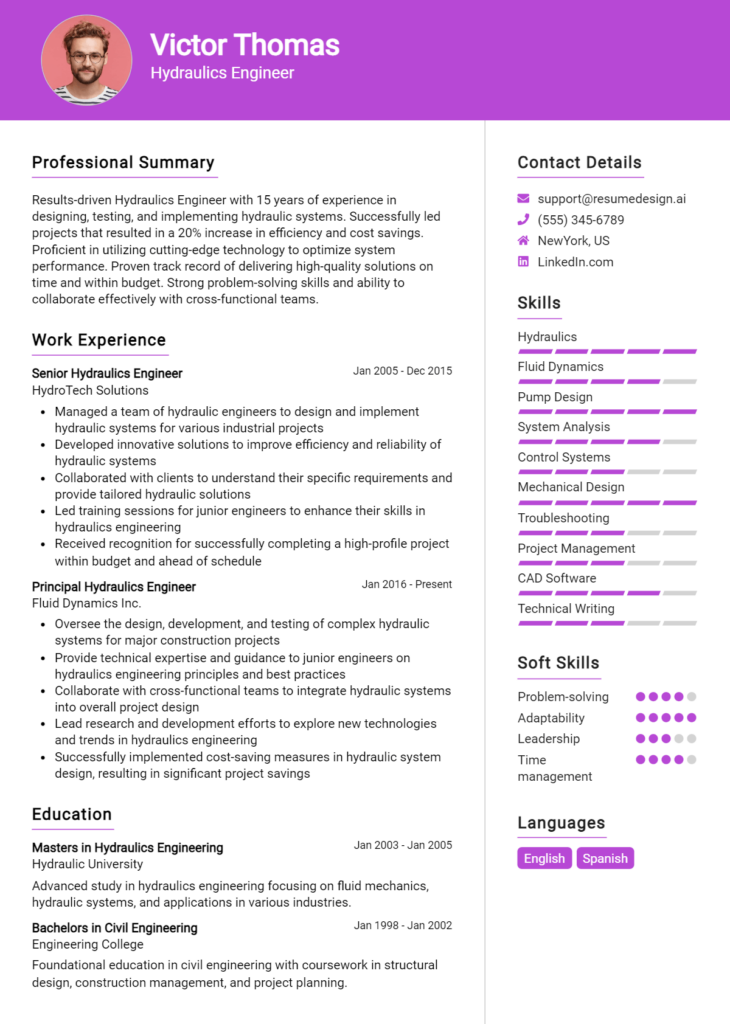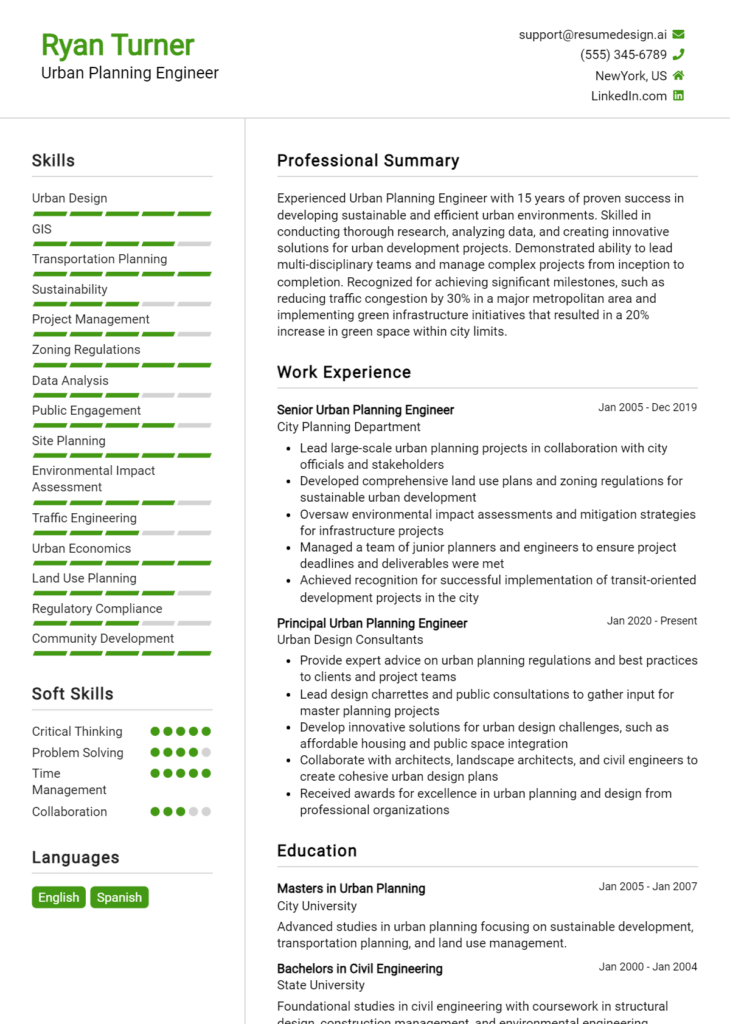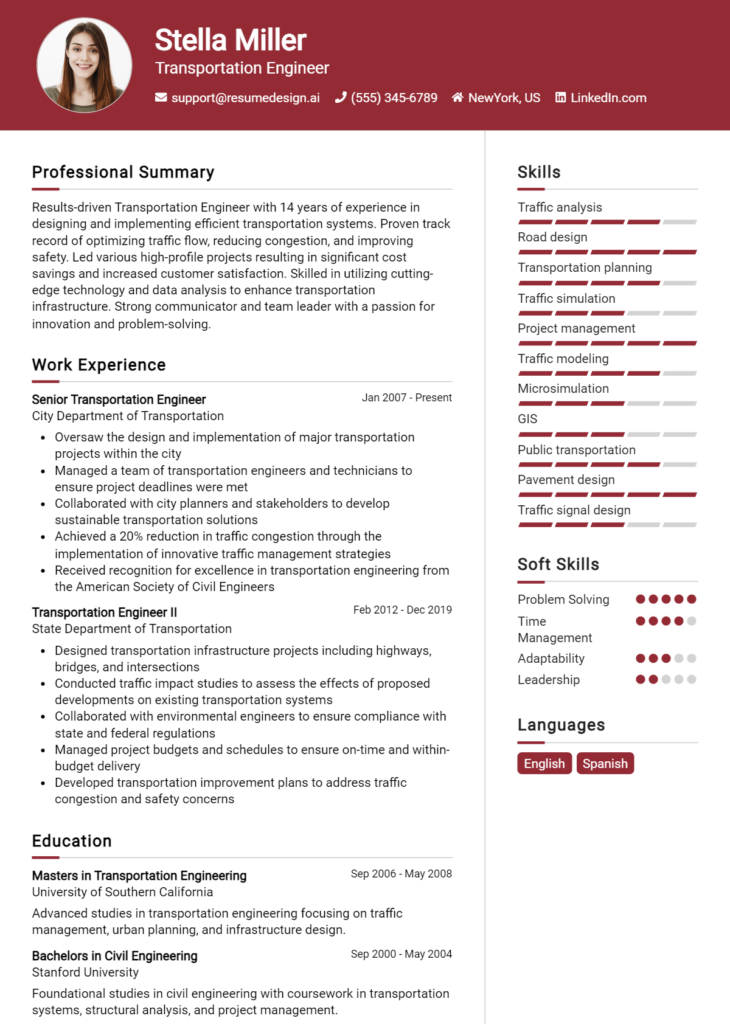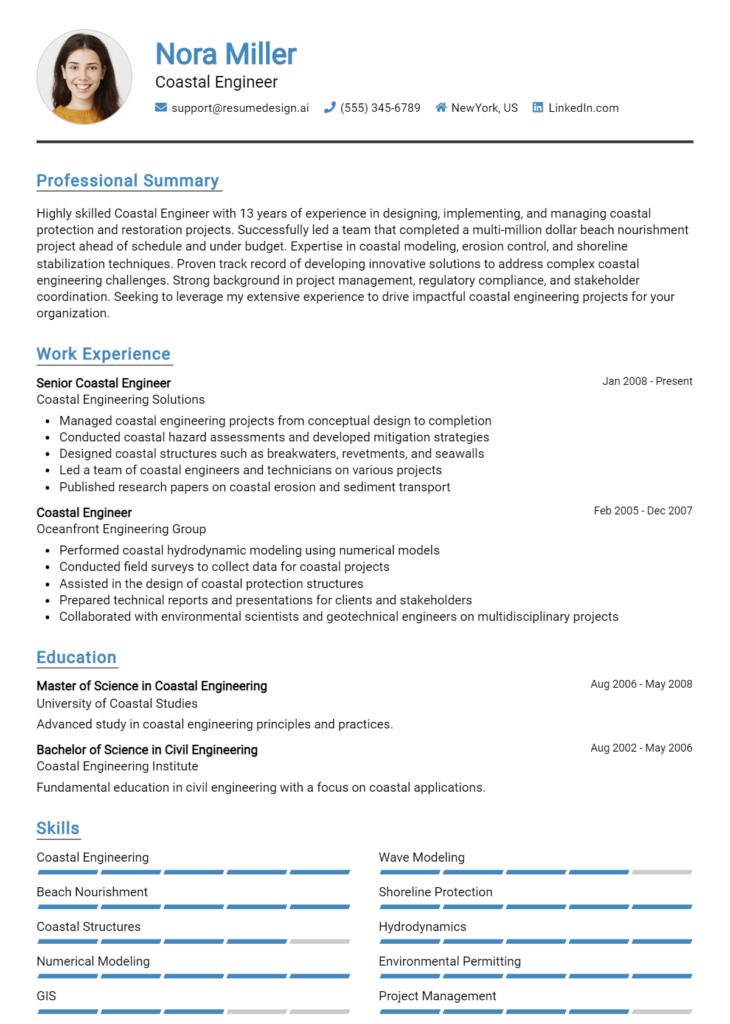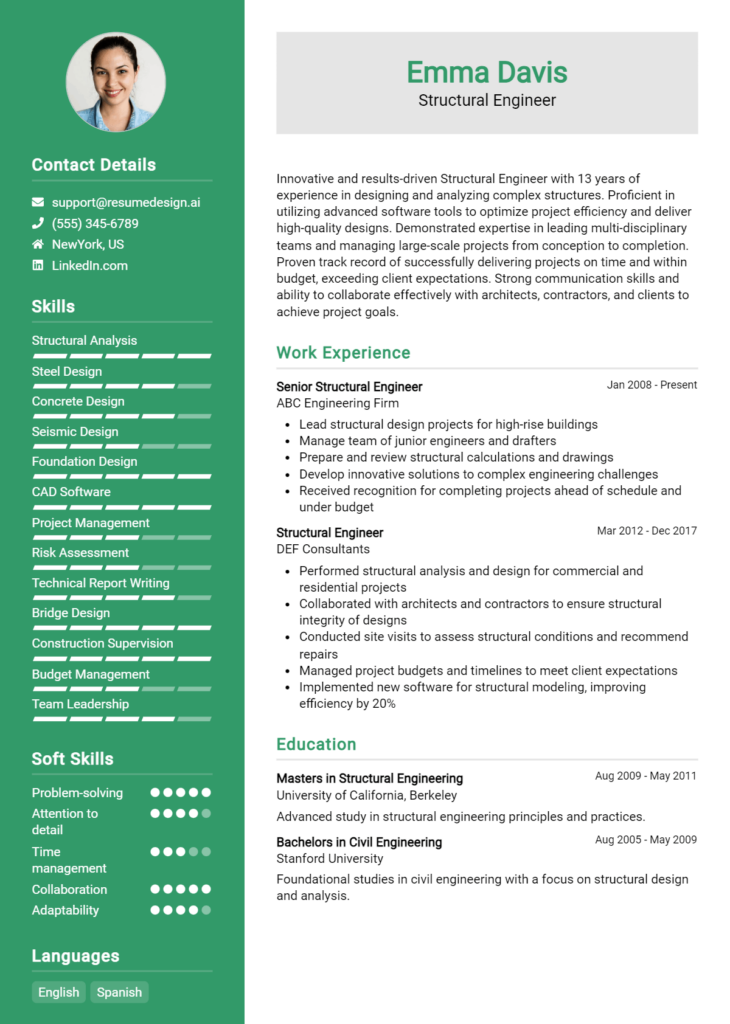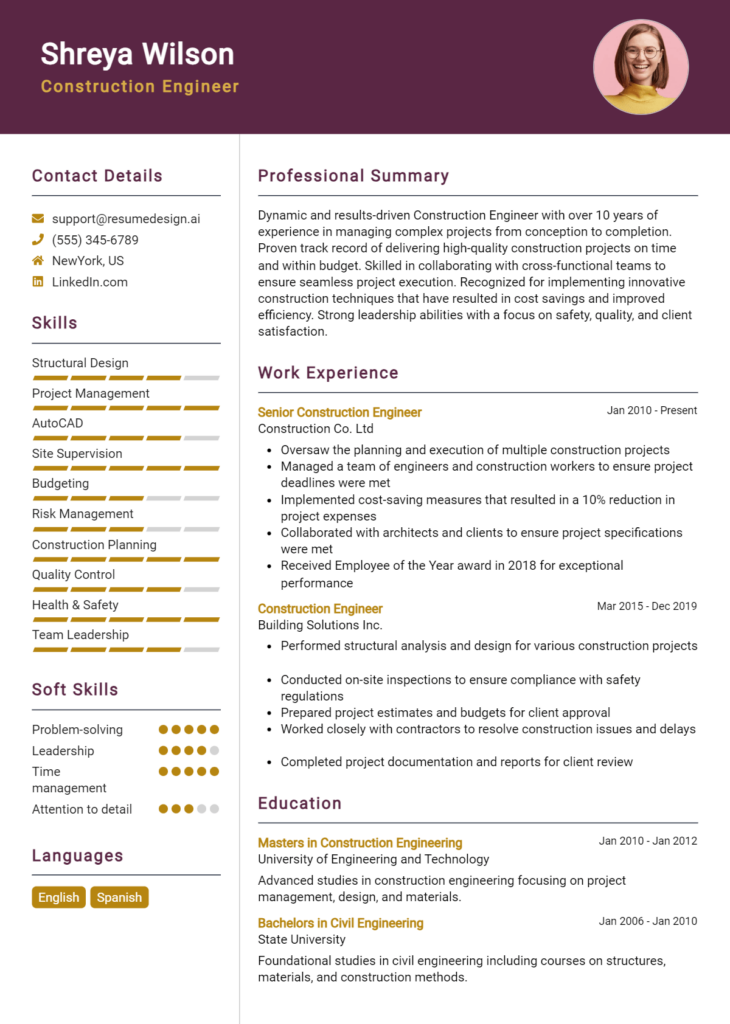Geotechnical Engineer Core Responsibilities
A Geotechnical Engineer plays a crucial role in assessing soil and rock properties to ensure safe and efficient design of structures. Key responsibilities include conducting site investigations, analyzing data, and providing recommendations on foundation design. Strong technical, operational, and problem-solving skills are essential, as this role often bridges various departments such as construction, environmental engineering, and urban planning. A well-structured resume highlighting these qualifications can significantly enhance career prospects and contribute to an organization's overall objectives.
Common Responsibilities Listed on Geotechnical Engineer Resume
- Conduct site investigations and geotechnical surveys.
- Analyze soil and rock data to determine material properties.
- Design and evaluate foundations, retaining structures, and slopes.
- Prepare geotechnical reports and documentation.
- Collaborate with architects and civil engineers on project specifications.
- Perform stability analyses for various construction projects.
- Monitor construction activities to ensure compliance with geotechnical recommendations.
- Provide expert advice on soil remediation and environmental impacts.
- Utilize software tools for modeling and data analysis.
- Conduct field tests and laboratory experiments on soil samples.
- Participate in project management and budgeting activities.
- Stay updated with industry standards and regulations.
High-Level Resume Tips for Geotechnical Engineer Professionals
In the competitive field of geotechnical engineering, a well-crafted resume is paramount for standing out among a pool of qualified candidates. Your resume is often the first impression you make on potential employers, serving as a snapshot of your skills, achievements, and professional journey. It is essential that your resume not only showcases your technical capabilities but also reflects your contributions to past projects and your understanding of industry standards. In this guide, we will provide practical and actionable resume tips specifically tailored for geotechnical engineer professionals, helping you to effectively communicate your value to prospective employers.
Top Resume Tips for Geotechnical Engineer Professionals
- Tailor your resume to the specific job description by using keywords and phrases that reflect the requirements listed in the posting.
- Highlight relevant work experience, focusing on projects that demonstrate your expertise in geotechnical analysis, design, and fieldwork.
- Quantify your achievements by including metrics, such as the percentage of cost savings you achieved or the number of successful projects completed under your supervision.
- Showcase industry-specific skills, such as soil mechanics, foundation design, and site investigation techniques, to align with the expectations of hiring managers.
- Include certifications and professional affiliations that reinforce your qualifications, such as your Professional Engineer (PE) license or membership in relevant organizations.
- Incorporate technical software proficiency, such as experience with geotechnical modeling software or data analysis tools, to demonstrate your technical capabilities.
- Present a clear and concise summary statement at the top of your resume that encapsulates your career highlights and unique selling points.
- Use a clean and professional format that enhances readability, making it easy for hiring managers to quickly scan your qualifications.
- Emphasize teamwork and collaboration skills, as geotechnical projects often require coordination with architects, contractors, and other engineering disciplines.
By implementing these tips, you can significantly enhance your chances of landing a job in the geotechnical engineering field. A well-structured and tailored resume will not only showcase your qualifications but also demonstrate your commitment to the profession, making you a compelling candidate for potential employers.
Why Resume Headlines & Titles are Important for Geotechnical Engineer
In the competitive field of geotechnical engineering, resume headlines and titles play a critical role in capturing the attention of hiring managers. A strong headline or title can serve as the first impression a candidate makes, succinctly summarizing their key qualifications in one impactful phrase. It should be concise, relevant, and directly aligned with the job being applied for, ensuring that it resonates with the specific needs of the employer. This strategic approach not only highlights the candidate’s expertise but also provides a quick reference point that can set them apart from other applicants in a crowded job market.
Best Practices for Crafting Resume Headlines for Geotechnical Engineer
- Keep it concise—aim for one impactful sentence or phrase.
- Use role-specific keywords that align with the job description.
- Highlight your key strengths, such as years of experience or specialized skills.
- Incorporate measurable achievements to demonstrate your impact.
- Avoid jargon or overly technical terms that may not be understood by all readers.
- Make it unique to stand out from generic headlines.
- Focus on your unique selling points that relate to the geotechnical engineering field.
- Revise and update your headline for each job application to ensure relevance.
Example Resume Headlines for Geotechnical Engineer
Strong Resume Headlines
"Experienced Geotechnical Engineer Specializing in Soil Mechanics and Foundation Design"
“Results-Driven Geotechnical Engineer with 10+ Years in Project Management and Site Investigations”
“Innovative Geotechnical Professional with Proven Success in Sustainable Design Solutions”
Weak Resume Headlines
“Engineer Looking for a Job”
“Geotechnical Engineer”
The strong headlines are effective because they clearly communicate the candidate's specific skills, experience, and value in a succinct manner, immediately appealing to hiring managers. In contrast, the weak headlines fail to impress because they are vague and lack any unique selling points, making it challenging for hiring managers to discern the candidate's qualifications or fit for the role. By crafting compelling headlines, candidates can significantly enhance their chances of landing an interview in the competitive field of geotechnical engineering.
Writing an Exceptional Geotechnical Engineer Resume Summary
A resume summary is a critical component of a Geotechnical Engineer's application, serving as a powerful introduction that can immediately capture the attention of hiring managers. In a competitive job market, a well-crafted summary highlights key skills, relevant experience, and notable accomplishments specific to the geotechnical engineering field. By providing a concise and impactful overview of qualifications, the summary sets the tone for the rest of the resume, making it essential for candidates to tailor this section to align with the specific job they are applying for.
Best Practices for Writing a Geotechnical Engineer Resume Summary
- Quantify Achievements: Use numbers and metrics to demonstrate the impact of your work, such as project budgets or percentages of cost savings.
- Focus on Relevant Skills: Highlight technical skills, software proficiencies, and certifications that are directly related to geotechnical engineering.
- Tailor to the Job Description: Customize your summary to reflect the specific qualifications and responsibilities mentioned in the job posting.
- Keep it Concise: Aim for 3-5 sentences that succinctly convey your professional identity and value proposition.
- Showcase Problem-Solving Abilities: Include examples of how you've successfully addressed engineering challenges in previous roles.
- Highlight Collaboration: Mention teamwork and communication skills, as these are crucial in multidisciplinary projects.
- Use Action-Oriented Language: Employ strong verbs and confident phrasing to convey a sense of authority and competence.
- Maintain Professional Tone: Ensure the summary reflects a professional demeanor appropriate for a technical field.
Example Geotechnical Engineer Resume Summaries
Strong Resume Summaries
Results-driven Geotechnical Engineer with over 8 years of experience in designing and implementing soil improvement techniques, achieving a 20% reduction in project costs through innovative solutions. Proficient in geotechnical analysis software and skilled in site investigation, foundation design, and slope stability analysis.
Detail-oriented Geotechnical Engineer with a proven track record of successful project management, overseeing over 15 large-scale projects with budgets exceeding $5 million. Expert in performing advanced geotechnical analyses and ensuring compliance with safety regulations, leading to a 95% project success rate.
Dynamic Geotechnical Engineer with expertise in environmental geotechnics and remediation projects, having successfully reduced contamination levels by 30% in several high-profile sites. Strong communicator with a focus on collaboration across multidisciplinary teams to deliver effective engineering solutions.
Weak Resume Summaries
Experienced engineer looking for a position in geotechnical engineering. I have worked on various projects and have some skills in engineering.
Geotechnical Engineer with background in soil mechanics and construction. Seeking to contribute to a company with strong team collaboration.
The strong resume summaries are effective because they provide specific, quantifiable achievements and relevant skills that directly relate to the role of a Geotechnical Engineer. They highlight the candidate's experience and the impact of their work, which makes them stand out to hiring managers. Conversely, the weak summaries lack detail and specificity, making them vague and less compelling, failing to convey the candidate's qualifications effectively.
Work Experience Section for Geotechnical Engineer Resume
The work experience section of a Geotechnical Engineer resume is critical as it provides potential employers with insight into the candidate's professional background and technical capabilities. This section effectively showcases the candidate's proficiency in geotechnical principles, project management skills, and ability to lead teams in delivering high-quality engineering solutions. By quantifying achievements and aligning experiences with industry standards, candidates can demonstrate their value and suitability for the role, making it essential for standing out in a competitive job market.
Best Practices for Geotechnical Engineer Work Experience
- Focus on specific technical skills relevant to geotechnical engineering, such as soil analysis, foundation design, and slope stability assessment.
- Quantify achievements using metrics, such as project completion time, cost savings, or improvements in safety and efficiency.
- Highlight leadership experiences, including team management, mentoring junior engineers, and coordinating with multidisciplinary teams.
- Include relevant software proficiency, such as AutoCAD, PLAXIS, or GeoSlope, showcasing your technical toolkit.
- Align your experiences with industry standards and best practices to demonstrate awareness of current trends and regulations.
- Use action verbs to convey a sense of proactivity and impact in your previous roles.
- Tailor the work experience section to reflect the specific requirements of the job you are applying for.
- Incorporate collaboration examples, emphasizing successful partnerships with clients, contractors, and regulatory agencies.
Example Work Experiences for Geotechnical Engineer
Strong Experiences
- Led a team of engineers in the design and execution of a $5 million foundation project, completing it 20% under budget and two months ahead of schedule.
- Conducted comprehensive soil investigations for a large-scale commercial development, resulting in a 30% reduction in project risk and enhanced structural integrity.
- Implemented innovative geotechnical solutions that improved site drainage, reducing flooding incidents by 40% in the surrounding community.
- Collaborated with cross-functional teams to optimize designs, achieving a 15% increase in project efficiency while maintaining compliance with local regulations.
Weak Experiences
- Worked on various projects involving soil tests and analysis.
- Assisted in the preparation of reports and documentation for geotechnical assessments.
- Participated in team meetings to discuss project progress and strategies.
- Involved in general engineering tasks and support activities.
The examples provided illustrate a clear distinction between strong and weak experiences. Strong experiences are characterized by specific, quantifiable achievements that demonstrate technical expertise and leadership, while weak experiences lack detail and fail to convey the candidate's impact or contributions. By emphasizing measurable outcomes and collaborative efforts in the strong examples, candidates can effectively showcase their qualifications for potential employers.
Education and Certifications Section for Geotechnical Engineer Resume
The education and certifications section of a Geotechnical Engineer resume plays a pivotal role in showcasing a candidate's qualifications and commitment to the field. It highlights the academic background necessary for understanding complex geotechnical principles and practices, as well as any industry-recognized certifications that validate the candidate's expertise. This section not only demonstrates the candidate's foundational knowledge but also emphasizes their dedication to continuous learning and professional development. By providing relevant coursework, certifications, and specialized training, candidates can significantly enhance their credibility and alignment with the job role, making them more attractive to potential employers.
Best Practices for Geotechnical Engineer Education and Certifications
- Include only relevant degrees and certifications that directly pertain to geotechnical engineering.
- List your highest degree first, followed by any additional degrees in chronological order.
- Highlight any specialized certifications, such as Professional Engineer (PE) or Certified Engineering Geologist (CEG).
- Include relevant coursework that demonstrates specialized knowledge or skills applicable to geotechnical projects.
- Use clear and concise formatting to improve readability and emphasize important credentials.
- Update the section regularly to reflect new certifications or training received.
- Consider including affiliations with professional organizations related to geotechnical engineering.
- Be specific about the issuing organizations for certifications to ensure credibility.
Example Education and Certifications for Geotechnical Engineer
Strong Examples
- M.S. in Geotechnical Engineering, University of California, Berkeley, 2021
- Professional Engineer (PE) License, California Board for Professional Engineers, 2022
- Certified Geotechnical Engineer (CGE), American Society of Civil Engineers, 2023
- Relevant Coursework: Advanced Soil Mechanics, Ground Improvement Techniques, and Foundation Engineering.
Weak Examples
- Bachelor of Arts in English Literature, University of Michigan, 2010
- Certification in Project Management (not specific to engineering), 2015
- Online course in Basic HTML, 2020
- High school diploma from Springfield High School, 2008
The examples provided are considered strong because they directly relate to the field of geotechnical engineering, showcasing relevant degrees and certifications that enhance the candidate's qualifications. In contrast, the weak examples illustrate educational qualifications or certifications that are either irrelevant to the role or outdated, failing to demonstrate the specialized knowledge and skills expected of a Geotechnical Engineer. This distinction is crucial for potential employers assessing the candidate's fit for the position.
Top Skills & Keywords for Geotechnical Engineer Resume
As a Geotechnical Engineer, showcasing the right skills on your resume is crucial for standing out in a competitive job market. Employers look for candidates who not only demonstrate technical expertise but also possess essential soft skills that enhance collaboration and problem-solving abilities. A well-rounded resume should highlight a combination of these skills, reflecting a candidate's proficiency in geotechnical analysis, project management, and effective communication. By emphasizing both hard and soft skills, you can create a compelling narrative that illustrates your capabilities and readiness to tackle complex engineering challenges. For more insights on enhancing your resume, check out the skills and work experience sections.
Top Hard & Soft Skills for Geotechnical Engineer
Soft Skills
- Problem-solving
- Communication
- Teamwork
- Time management
- Attention to detail
- Critical thinking
- Adaptability
- Leadership
- Negotiation
- Conflict resolution
- Project management
- Creativity
Hard Skills
- Soil mechanics
- Geotechnical investigation
- Foundation design
- Slope stability analysis
- Ground improvement techniques
- Geosynthetics application
- Site characterization
- Earth retention systems
- Numerical modeling software (e.g., PLAXIS, GeoStudio)
- AutoCAD and civil engineering software
- Laboratory testing methods
- Environmental assessment techniques
- Risk assessment and management
- Construction methods and materials
- Regulatory compliance knowledge
Stand Out with a Winning Geotechnical Engineer Cover Letter
Dear [Hiring Manager's Name],
I am writing to express my interest in the Geotechnical Engineer position at [Company Name], as advertised on [Where You Found the Job Posting]. With a Master’s degree in Geotechnical Engineering from [Your University] and over [X years] of hands-on experience in soil analysis, foundation design, and site investigations, I am confident in my ability to contribute effectively to your team. My background in [specific relevant experience or project] has equipped me with a practical understanding of geotechnical principles and the ability to apply them in real-world scenarios, ensuring successful project outcomes.
In my previous role at [Your Last Company], I successfully led a team in conducting comprehensive geotechnical investigations for [specific project or type of project], where I utilized advanced software tools to analyze soil behavior and assess site conditions. This project not only honed my technical skills but also enhanced my project management capabilities, allowing me to coordinate with multidisciplinary teams while adhering to strict timelines and budgets. My commitment to safety and sustainability, coupled with my effective communication skills, has enabled me to present complex geotechnical concepts to clients and stakeholders in a clear and persuasive manner.
I am particularly drawn to [Company Name] due to its reputation for innovation and excellence in civil engineering projects. I am eager to bring my expertise in geotechnical analysis and problem-solving to your team, contributing to the development of safe and sustainable infrastructure solutions. I believe that my proactive approach and passion for geotechnics will align well with the goals of [Company Name], and I am excited about the opportunity to be a part of your esteemed organization.
Thank you for considering my application. I look forward to the possibility of discussing how my skills and experiences can benefit [Company Name]. Please feel free to contact me at [Your Phone Number] or [Your Email] to arrange a convenient time for an interview.
Sincerely,
[Your Name]
[Your LinkedIn Profile] (if applicable)
[Your Address]
Common Mistakes to Avoid in a Geotechnical Engineer Resume
When crafting a resume for a Geotechnical Engineer position, it's crucial to present your skills and experience effectively. However, many candidates make common mistakes that can hinder their chances of landing an interview. Understanding these pitfalls can significantly enhance your resume's impact, ensuring that it highlights your qualifications and aligns with the expectations of hiring managers in the engineering field. Here are some common mistakes to avoid:
Vague Job Descriptions: Using generic language instead of specific details about your roles can make it difficult for employers to understand your actual contributions and expertise in geotechnical engineering.
Neglecting Technical Skills: Failing to list relevant technical skills, such as software proficiency (e.g., AutoCAD, PLAXIS) or specific geotechnical methods, can result in your resume being overlooked by automated applicant tracking systems.
Inconsistent Formatting: A disorganized or inconsistent format can distract from the content of your resume. Ensure that fonts, bullet points, and spacing are uniform throughout to create a professional appearance.
Too Much Technical Jargon: While technical terms are important, overloading your resume with jargon may alienate hiring managers who may not be as familiar with specialized language. Aim for clarity while maintaining professionalism.
Ignoring Accomplishments: Merely listing job responsibilities without highlighting accomplishments can make your resume less impactful. Use quantifiable achievements to demonstrate your contributions, such as project success rates or cost savings.
Omitting Relevant Certifications: Certifications such as Professional Engineer (PE) or Geotechnical Engineering certifications are significant assets. Failing to include these can make your application less competitive.
Lack of Tailoring for Each Application: Sending out a one-size-fits-all resume can be detrimental. Tailor your resume for each job application by emphasizing the experiences and skills that align with the specific role and company.
Excessive Length: Including unnecessary information or making your resume too lengthy can lead to a loss of interest from hiring managers. Aim for a concise resume, ideally one page, focusing on the most relevant experiences and skills.
Conclusion
As we wrap up our discussion on the essential skills and qualifications for a Geotechnical Engineer, it's crucial to highlight the importance of a well-crafted resume that reflects your expertise and experience in the field. We explored the key competencies required for this role, including a strong background in soil mechanics, proficiency in geotechnical analysis software, and the ability to conduct thorough site investigations.
Additionally, we examined the significance of effective communication skills and teamwork, as these are vital for collaborating with other engineers, architects, and construction teams. Your resume should not only showcase your technical abilities but also demonstrate your problem-solving skills and project management experience.
Now is the perfect time to take a closer look at your Geotechnical Engineer resume. Are you presenting your qualifications in the best possible light? To assist you in this process, consider utilizing the various resources available to enhance your resume. You can access resume templates to find a design that suits your style, use the resume builder for a streamlined creation process, review resume examples for inspiration, and don’t forget about cover letter templates to complement your application.
Take action today and ensure your resume effectively showcases your qualifications as a Geotechnical Engineer!

